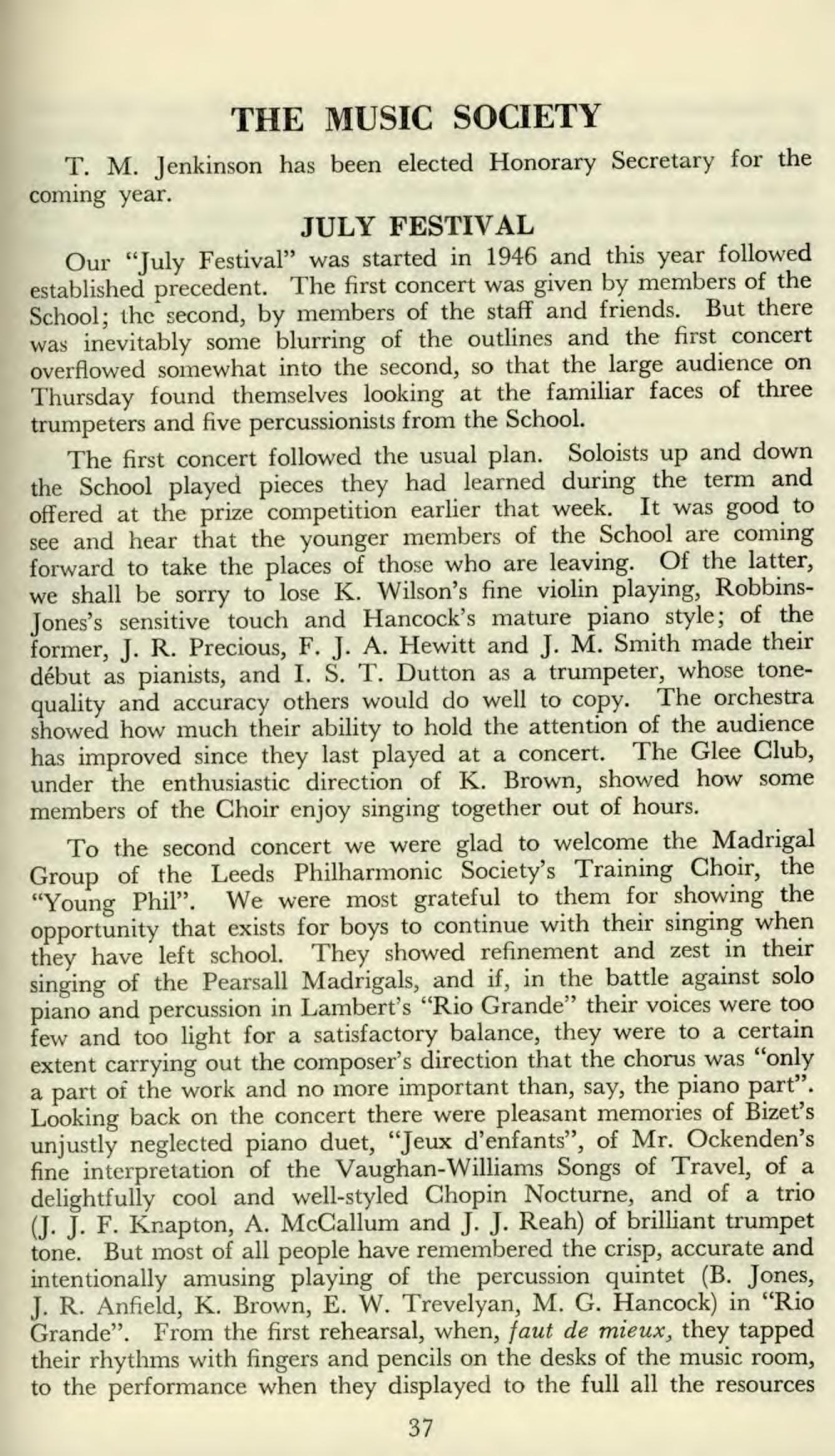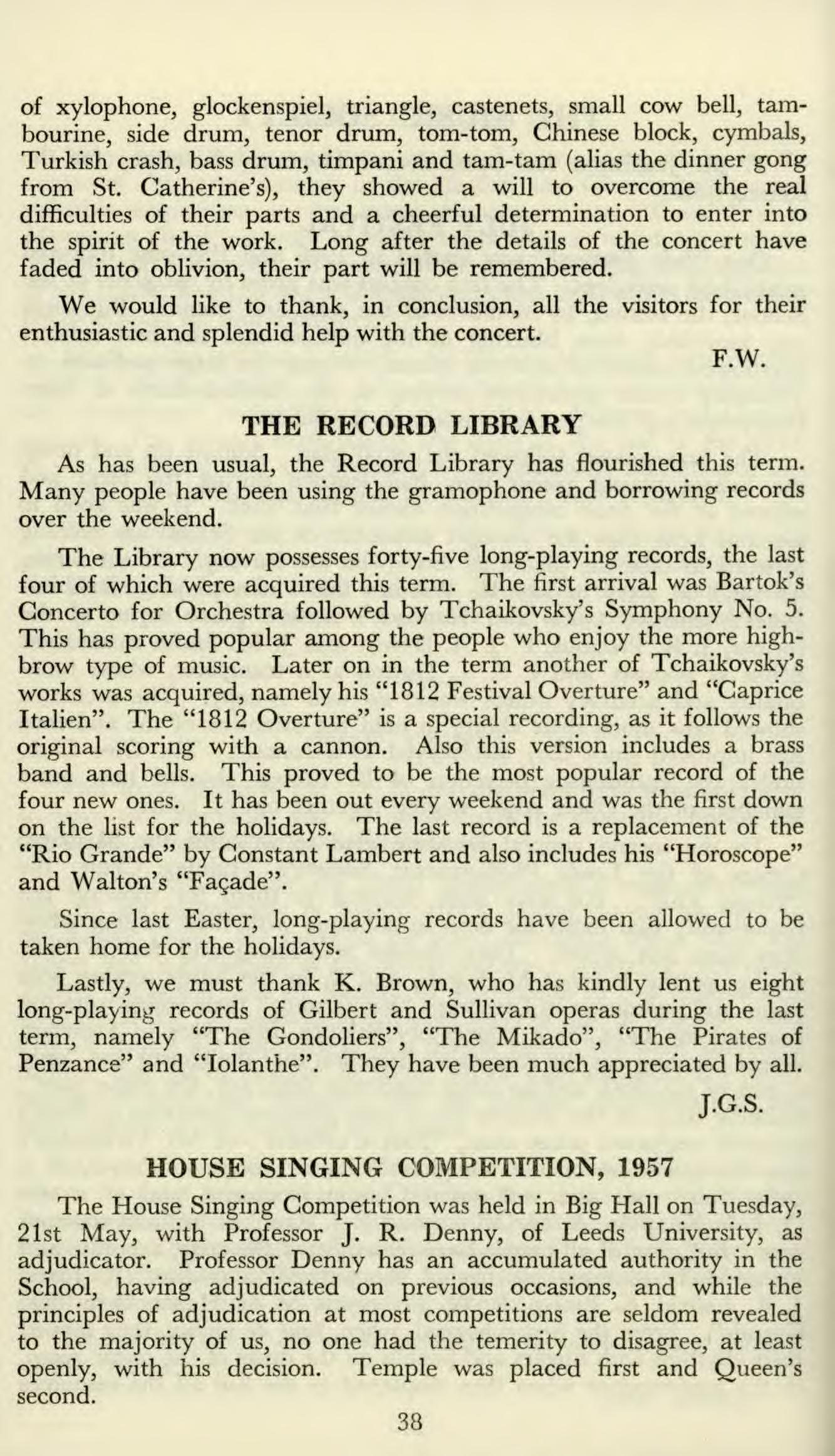
4 minute read
The Music Society
from Oct 1957
by StPetersYork
T. M. Jenkinson has been elected Honorary Secretary for the coming year.
JULY FESTIVAL
Our "July Festival" was started in 1946 and this year followed established precedent. The first concert was given by members of the School; the second, by members of the staff and friends. But there was inevitably some blurring of the outlines and the first concert overflowed somewhat into the second, so that the large audience on Thursday found themselves looking at the familiar faces of three trumpeters and five percussionists from the School.
The first concert followed the usual plan. Soloists up and down the School played pieces they had learned during the term and offered at the prize competition earlier that week. It was good to see and hear that the younger members of the School are coming forward to take the places of those who are leaving. Of the latter, we shall be sorry to lose K. Wilson's fine violin playing, RobbinsJones's sensitive touch and Hancock's mature piano style; of the former, J. R. Precious, F. J. A. Hewitt and J. M. Smith made their debut as pianists, and I. S. T. Dutton as a trumpeter, whose tonequality and accuracy others would do well to copy. The orchestra showed how much their ability to hold the attention of the audience has improved since they last played at a concert. The Glee Club, under the enthusiastic direction of K. Brown, showed how some members of the Choir enjoy singing together out of hours.
To the second concert we were glad to welcome the Madrigal Group of the Leeds Philharmonic Society's Training Choir, the "Young Phil". We were most grateful to them for showing the opportunity that exists for boys to continue with their singing when they have left school. They showed refinement and zest in their singing of the Pearsall Madrigals, and if, in the battle against solo piano and percussion in Lambert's "Rio Grande" their voices were too few and too light for a satisfactory balance, they were to a certain extent carrying out the composer's direction that the chorus was "only a part of the work and no more important than, say, the piano part". Looking back on the concert there were pleasant memories of Bizet's unjustly neglected piano duet, "Jeux d'enfants", of Mr. Ockenden's fine interpretation of the Vaughan-Williams Songs of Travel, of a delightfully cool and well-styled Chopin Nocturne, and of a trio (J. J. F. Knapton, A. McCallum and J. J. Reah) of brilliant trumpet tone. But most of all people have remembered the crisp, accurate and intentionally amusing playing of the percussion quintet (B. Jones, J. R. Anfield, K. Brown, E. W. Trevelyan, M. G. Hancock) in "Rio Grande". From the first rehearsal, when, faut de mieux, they tapped their rhythms with fingers and pencils on the desks of the music room, to the performance when they displayed to the full all the resources 37
of xylophone, glockenspiel, triangle, castenets, small cow bell, tambourine, side drum, tenor drum, tom-tom, Chinese block, cymbals, Turkish crash, bass drum, timpani and tam-tam (alias the dinner gong from St. Catherine's), they showed a will to overcome the real difficulties of their parts and a cheerful determination to enter into the spirit of the work. Long after the details of the concert have faded into oblivion, their part will be remembered.
We would like to thank, in conclusion, all the visitors for their enthusiastic and splendid help with the concert.
F.W.
THE RECORD LIBRARY
As has been usual, the Record Library has flourished this term. Many people have been using the gramophone and borrowing records over the weekend.
The Library now possesses forty-five long-playing records, the last four of which were acquired this term. The first arrival was Bartok's Concerto for Orchestra followed by Tchaikovsky's Symphony No. 5. This has proved popular among the people who enjoy the more highbrow type of music. Later on in the term another of Tchaikovsky's works was acquired, namely his "1812 Festival Overture" and "Caprice Italien". The "1812 Overture" is a special recording, as it follows the original scoring with a cannon. Also this version includes a brass band and bells. This proved to be the most popular record of the four new ones. It has been out every weekend and was the first down on the list for the holidays. The last record is a replacement of the "Rio Grande" by Constant Lambert and also includes his "Horoscope" and Walton's "Façade".
Since last Easter, long-playing records have been allowed to be taken home for the holidays.
Lastly, we must thank K. Brown, who has kindly lent us eight long-playing records of Gilbert and Sullivan operas during the last term, namely "The Gondoliers", "The Mikado", "The Pirates of Penzance" and "lolanthe". They have been much appreciated by all. J.G.S.

HOUSE SINGING COMPETITION, 1957
The House Singing Competition was held in Big Hall on Tuesday, 21st May, with Professor J. R. Denny, of Leeds University, as adjudicator. Professor Denny has an accumulated authority in the School, having adjudicated on previous occasions, and while the principles of adjudication at most competitions are seldom revealed to the majority of us, no one had the temerity to disagree, at least openly, with his decision. Temple was placed first and Queen's second.










